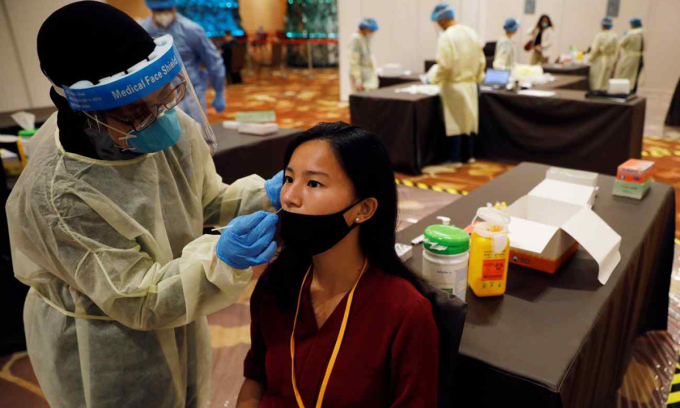Risks of constantly being re-infected with Covid-19
USA - Re-infection with nCoV can lead to heart and lung problems, increasing the risk of hospitalization and the possibility of prolonged Covid-19 infection.
The symptoms of Covid-19 are now less severe, but people who have been sick many times still have to bear some health risks. Research in the journal Nature Medicine shows that reinfection with the virus can damage several vital organs. Dr. Ziyad Al-Aly, clinical epidemiologist and lead author of the study, noted the health effects of the disease, both short and long term.
According to the study, people who got Covid-19 more than once were three times more likely to be hospitalized and twice as likely to die than those who had one. People who are often re-infected are also susceptible to other dangerous diseases. The risk of lung problems is 3.5 times higher, the risk of heart disease is three times higher, and the risk of neurological problems is 1.6 times higher.
This result is consistent with studies documenting the effects of Covid-19 on the body last year. In a number of reports by the Association for Neuroscience in November 2022, scientists said that the inflammation caused by Covid-19 can have long-term effects on the brain, including in children. The study involved 14 children, aged 10 to 13, who had changes in specific areas of the brain about 15 months after contracting the virus. Adults with mild infections of nCoV also have brain changes about 4 months after contracting the disease.
Studies over a recent year have shown that repeated viral infections - which are increasingly common as the pandemic lingers and become endemic - can have complex effects. "We wanted to see if reinfection had too much of an effect, whether the immune system had adapted by detecting viruses before and had developed a way to deal with them?" Dr. Al-Aly asked the question.

Al-Aly said that a person's second or third virus infections certainly contribute to further health problems, even if they have been vaccinated. After each illness, the body's ability to recover decreases a little more. At some point, the virus attacks enough, the disease will put the body in a dangerous state.
"Added up, each infection can bring you closer to your body's limits. That's why we should avoid reinfection to stay healthy in general," he said.
Repeated infection with nCoV may increase the risk of prolonged Covid-19 infection. Scientists don't know the risk factors that cause some people to develop persistent symptoms after testing negative. However, they recognize that any illness can promote the condition.
"Many people say I had Covid-19 and had no lasting problems. That's good. But remember, just because you dodge bullets once doesn't mean luck will appear a second time. You are available. willing to bet?", Dr. Al-Aly said.
Recurrence cases of Covid-19 could put pressure on the health system, as the incidence of other respiratory illnesses soars. Many Southeast Asian countries are now reporting increased hospitalizations. People with repeated illnesses can create an additional burden.
According to Dr. Al-Aly, the best way to prevent reinfection is vaccination, especially booster dose; Wear a mask in public and avoid large gatherings if you feel you have symptoms of illness.
"We do not call for a blockade or implementation of draconian measures, but want to inform people of the risks, encourage the implementation of measures to prevent the risk of personal infection. Consequences of the second infection. Monday and Tuesday are not as gentle as many people think," he said.
* SOURCE: https://vnexpress.net/rui-ro-khi-lien-tuc-tai-nhiem-covid-19-4594495.html









 Facebook
Facebook
 Tweet
Tweet
 Zalo
Zalo







 News
News

















 Sign in with Facebook
Sign in with Facebook
 Sign in with Google
Sign in with Google